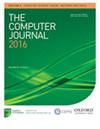The Orbits of Folded Crossed Cubes
IF 1.5
4区 计算机科学
Q4 COMPUTER SCIENCE, HARDWARE & ARCHITECTURE
引用次数: 0
Abstract
Abstract Two vertices $u$ and $v$ in a graph $G=(V,E)$ are in the same orbit if there exists an automorphism $\phi $ of $G$ such that $\phi (u)=v$. The orbit number of a graph $G$, denoted by $Orb(G)$, is the smallest number of orbits, which form a partition of $V(G)$, in $G$. All vertex-transitive graphs $G$ are with $Orb(G)=1$. Since the $n$-dimensional hypercube, denoted by $Q_{n}$, is vertex-transitive, it follows that $Orb(Q_{n})=1$ for $n\geq 1$. Pai, Chang, and Yang proved that the $n$-dimensional folded crossed cube, denoted by $FCQ_{n}$, is vertex-transitive if and only if $n\in \{1,2,4\}$, namely $Orb(FCQ_{1})=Orb(FCQ_{2})=Orb(FCQ_{4})=1$. In this paper, we prove that $Orb(FCQ_{n})=2^{\lceil \frac{n}{2}\rceil -2}$ if $n\geq 6$ is even and $Orb(FCQ_{n}) = 2^{\lceil \frac{n}{2}\rceil -1}$ if $n\geq 3$ is odd.折叠交叉立方体的轨道
摘要图$G=(V,E)$中的两个顶点$u$和$v$在同一轨道上,如果$G$存在自同构$\phi $,使得$\phi (u)=v$。图$G$的轨道数,用$Orb(G)$表示,是在$G$中形成$V(G)$分区的最小轨道数。所有顶点传递图$G$都使用$Orb(G)=1$。由于$n$维超立方体(用$Q_{n}$表示)是顶点可传递的,因此$Orb(Q_{n})=1$表示$n\geq 1$。Pai、Chang和Yang证明了$n$维折叠交叉立方体(表示为$FCQ_{n}$)顶点可传递当且仅当$n\in \{1,2,4\}$即$Orb(FCQ_{1})=Orb(FCQ_{2})=Orb(FCQ_{4})=1$。本文证明了$Orb(FCQ_{n})=2^{\lceil \frac{n}{2}\rceil -2}$如果$n\geq 6$是偶数,$Orb(FCQ_{n}) = 2^{\lceil \frac{n}{2}\rceil -1}$如果$n\geq 3$是奇数。
本文章由计算机程序翻译,如有差异,请以英文原文为准。
求助全文
约1分钟内获得全文
求助全文
来源期刊

Computer Journal
工程技术-计算机:软件工程
CiteScore
3.60
自引率
7.10%
发文量
164
审稿时长
4.8 months
期刊介绍:
The Computer Journal is one of the longest-established journals serving all branches of the academic computer science community. It is currently published in four sections.
 求助内容:
求助内容: 应助结果提醒方式:
应助结果提醒方式:


